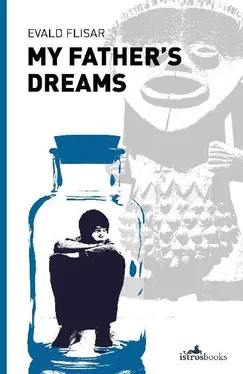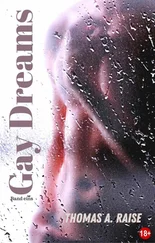During my second visit to Grandpa Dominic’s house I said nothing for a long time. And neither did he; sitting in his chair in front of the African gods he patiently waited for me to start, giving me an occasional encouraging smile. He could feel that I wanted to tell him something, and I was grateful to him for not hurrying me. I just couldn’t find the right words. A beam of sunlight shone through the window right on his face, the only beam that managed to penetrate the gloom of the cluttered room, and in it’s light grandpa’s face glowed with the serene expression of a saint.
This time he wasn’t wearing his uniform. He was wearing badly creased linen trousers and an unbuttoned striped shirt, which revealed a yellowish sweat-soaked vest. I could easily have mistaken him for someone else. His bearing was different, too; he wasn’t as upright as he had been during the storm. His face, exposed to sunlight, appeared much older. I didn’t know it then, but remembering these events now I realise that he must have been well into his eighties.
He reached for a cigar, slowly lit it, put out the flame of the match with a quick jerk of the wrist, and pushed the match into the breast pocket of his shirt. The smoke spiralled upward through the beam of light, vanishing in the darkness under the ceiling. Eve wasn’t at home; we were alone in the big house. Alone with the African gods, which stood quietly behind Grandpa Dominic’s back, barely visible in semi-darkness.
“How are the dreams?” he finally broke the silence. “Still there?”
I nodded. “But not for much longer. Father’s decided I need to be cured of them.”
“Oh,” he said and quickly drew on the cigar, expelling the smoke somewhere to the left, toward the rolled-up sea charts under the table.
“When was that?”
I told him that this happened a few days ago, following the visit of Dr. Kleindienst, the acknowledged dream expert. After talking to him in the basement of the health centre, where they went after dinner at our house, Father realised, perhaps at Dr. Kleindienst’s suggestion, that dreams were gradually washing me away from the shores of reality, and that I had to be pulled back before it was too late. This, Father could only do by sneaking into one of my dreams, so we could dream it together. He could then slowly guide me away from it and back to the normal state.
“But is that possible?” demanded Grandpa Dominic, sounding as if the question had slipped from his tongue. “Still, your Father is a doctor,” he corrected himself. “He should know, shouldn’t he? The question is, do you believe that’s possible?”
I said I saw no reason not to believe my father. Having practiced medicine for so many years, he must surely have cured cases far worse than mine.
“Of course,” muttered Grandpa Dominic.
He kept looking at me in a thoughtful way. He had smoked his cigar to the end, but did not dispose of the butt; instead he kept twisting it fitfully in his fingers.
“The dream is not an isolated psychic event completely cut from daily life,” I said. “If it seems so to us, that is only an illusion that arises from our lack of understanding.”
Grandpa Dominic gave me a startled look. Then he dropped the cigar butt into a glass of water on the oak table, twice licking the burn on the tip of his thumb.
“Do you read a lot?” he asked.
Oh yes, I said. I told him we had so many books at home that some had to be taken by Father to the health centre, and quite a few had been shifted up to the loft of our house. I read indiscriminately, often taking books off the shelves with eyes closed. But I never read any quite to the end. I flipped through books, reading only the bits that engaged my interest for whatever reason. Perhaps I had read too much or too many different things, for everything now seemed to be jumbled up in a strange mess in which I often got lost.
“I bet you do,” said Grandpa Dominic.
He took another cigar from the box, but did not light it immediately. Staring out the window, he kept tapping with it against the table until the bottom end began to fray and bits of tobacco came off. Finally he pushed it between his teeth.
“And what are you reading now?” he muttered as he struck a match.
I said I was reading a book which was in fact being read by Father, which meant that I was reading it only when he was at work. The book was Dream-analysis in its Practical Application, written by somebody called Carl Gustav Jung. I had found it on Father’s bedside table by chance as I passed the bedroom with the door ajar, and was attracted by its blue cover.
“Interesting reading?” asked Grandpa Dominic.
I said it was a difficult book to read, with long, complicated sentences, so I wasn’t reading all of it but only the bits underlined by Father. Some of those passages I did not understand either, but at least I knew why Father was reading the book: to get additional information on the subject of dreams, prior to his attempt to wrestle me from their destructive power, as he had put it.
“Do you read this book every day?”
I admitted that actually I was no longer reading it. Father had taken it to his surgery, where he read it whenever he managed to snatch a moment of time, and where he kept it locked away in his desk. He must have realised that I was reading the underlined passages, and felt that the book would increase my confusion. After all my problems had started with books; I had read too much and understood too little.
“But I’ve copied some of the underlined sentences,” I said, producing a folded sheet from my pocket. “Including those words I said earlier.”
Grandpa Dominic seemed relieved. “Yes, I was hoping they weren’t yours.”
I unfolded the sheet and read: “We must never forget in dream-analysis, even for a moment, that we move on treacherous ground where nothing is certain but uncertainty. A suitable warning to the dream-interpreter — if only it were not so paradoxical — would be: Do anything you like, only don’t try to understand.”
“Interesting,” was grandpa’s comment.
“Why then should we question the importance of unconscious happenings?” I carried on. “Dreams give information about the secrets of the inner life and reveal to the dreamer the hidden factors of his personality. As long as these are undiscovered, they disturb his waking life and betray themselves only in the form of symptoms.”
“Probably true,” agreed Grandpa Dominic, who had completely forgotten he was holding a burning cigar in his hand. “Have you much more of this?”
I nodded.
“Read me one more, and the rest we should leave for some other time, don’t you think?”
“I’ll read one that’s slightly longer,” I said by way of apology. I waited for grandpa to nod his assent before I continued.
“But if his relation to his Father is really excellent, why must the dream manufacture such an improbable story to discredit the father? The dreamer’s unconscious must have a distinct tendency to produce such a dream. Does the young man have resistances to his father, after all, which are perhaps fed by jealousy or a certain sense of inferiority? The answer, in this case, would be that his unconscious clearly tries to depreciate his father. If we take this as compensation, we are forced to the conclusion that his relation to his father is not only good but too good. His father is still too much the guarantor of his existence, and he is still living what I call a provisional life. He runs the risk of failing to realise himself because there is too much ‘father’ on every side. This is why the unconscious manufactures a kind of blasphemy: it seeks to lower the father and to elevate the son.”
Читать дальше












